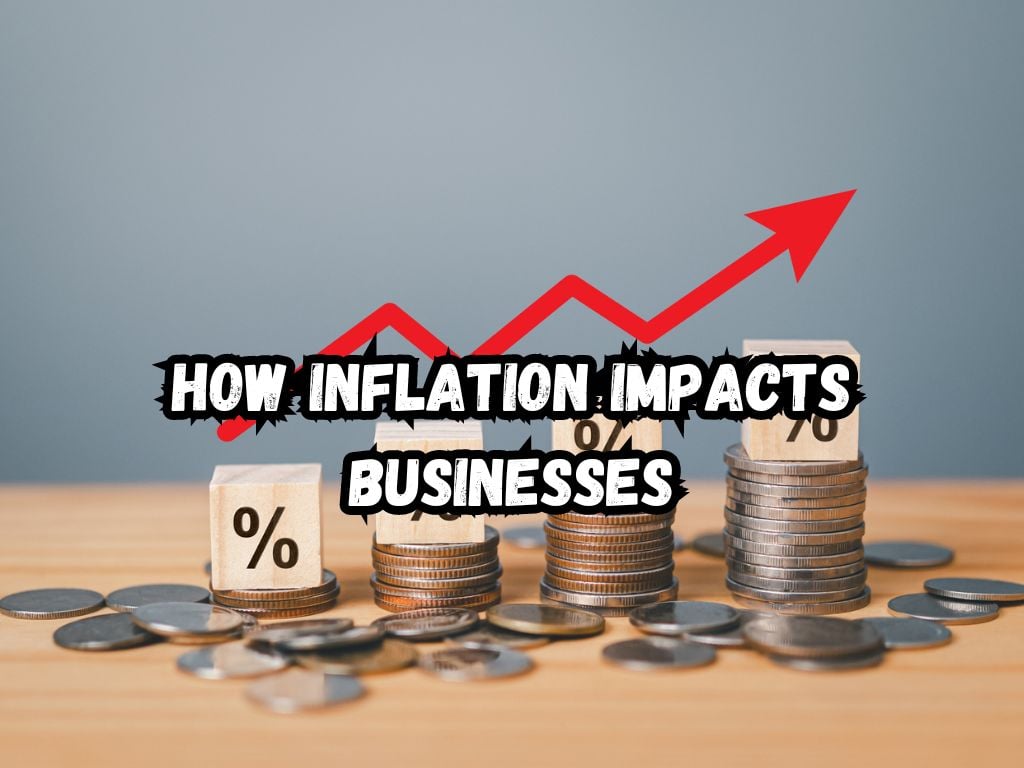Inflation is a term that rings alarm bells for both consumers and businesses alike. Its impact is far-reaching, influencing not just the cost of goods and services but also the very fabric of economic operations.
In this article, we will delve deep into how inflation impacts businesses, offering insights and strategies to navigate through these turbulent times.
Understanding Inflation
Inflation refers to the rate at which the general level of prices for goods and services is rising, and, subsequently, purchasing power is falling. Central banks attempt to limit inflation — and avoid deflation — to keep the economy running smoothly.
Various economic factors, such as demand-pull inflation, cost-push inflation, and built-in inflation, contribute to the overall inflationary trend.

How Inflation Impacts Businesses?
Rising Costs
One of the most immediate effects of inflation on business is the rise in costs. Raw materials become more expensive, manufacturing costs go up, and overheads swell.
Businesses can hedge against these rising costs by entering into long-term contracts at fixed prices or by diversifying their supplier base to mitigate risks.
Pricing Challenges
With the cost of production climbing, businesses face the tough decision of adjusting their pricing.
Keeping prices too low might erode profit margins, while setting them too high could alienate customers.
Employing dynamic pricing strategies, where prices are adjusted in response to market demand and conditions, might offer a solution.
Wage Pressures
As the cost of living increases, employees seek higher wages, putting additional pressure on businesses. Companies need to strike a balance between offering competitive wages and managing their overall cost structure.
Non-monetary benefits and a positive work culture can also help retain staff without significantly increasing costs.
Interest Rate Fluctuations
High inflation often leads to higher interest rates, affecting businesses that rely on loans for operations or expansion.
Refinancing existing debt at lower interest rates, when possible, can reduce financial burdens.
Supply Chain Disruptions
Inflation can disrupt global supply chains, causing delays and driving up costs.
Diversifying supply sources and keeping a close eye on inventory levels can help businesses stay resilient.
Changes in Consumer Behavior
Inflation alters consumer purchasing power and spending habits, which can lead to a decrease in sales volumes for businesses.
Focusing on offering essential, high-value products or services might help maintain sales.
Inventory Management
The costs associated with stocking and warehousing can escalate during inflationary periods.
Implementing just-in-time inventory systems might help reduce these carrying costs.
How to Mitigate the Effects of Inflation?
Cost Control and Efficiency
One way to combat the effects of inflation is to focus on cost control and operational efficiency. Streamlining operations, reducing wastage, and outsourcing non-core activities can help businesses improve their bottom line.
Diversification
Exploring new markets and diversifying product offerings can open up additional revenue streams, helping businesses to buffer against economic fluctuations.
Technological Adaptation
Investing in technology can streamline operations, improve efficiency, and reduce costs in the long run.
Automation and digital transformation are key strategies in this area.
Financial Planning
Adjusting both short-term and long-term financial plans is crucial during inflationary periods.
Businesses need to keep a close eye on their cash flow, adjust their budgets, and be prepared for fluctuations in their balance sheets.
Case Studies
Facing inflation, businesses across sectors have thrived by emphasizing key strategies. Operational efficiency gains, such as optimizing supply chains or employing technology for productivity, are fundamental.
Effective financial management, including cost control, strategic pricing, and vigilant budget oversight, helps maintain profitability.
Equally vital is nurturing a strong rapport with customers and suppliers, ensuring loyalty and securing favorable terms, respectively.
Through these approaches—optimizing operations, diligent financial practices, and solidifying partnerships—companies have deftly managed the challenges posed by inflation, sustaining and even growing their operations amidst economic uncertainties.

Frequently Asked Questions
How can businesses protect themselves against inflation?
Businesses can protect themselves by enhancing operational efficiencies, diversifying offerings, and adjusting their financial strategies.
What are the first signs of inflation affecting a business?
Rising costs of raw materials and operational expenses are often the first indicators of inflation’s impact.
How does inflation affect small businesses compared to large corporations?
Small businesses might feel the pinch more acutely due to smaller cash reserves and less bargaining power with suppliers.
Can inflation have positive effects on any businesses?
Certain sectors, like real estate, can benefit from inflation as the value of assets increases.
How should businesses adjust their financial planning in times of inflation?
Focusing on cash flow management, revising budgets, and potential refinancing options are key adjustments businesses should consider.
Conclusion
The impacts of inflation on businesses are manifold, affecting everything from costs and pricing to supply chains and consumer behavior.
However, by employing strategic planning and operational efficiencies, businesses can not only survive but thrive in an inflationary environment.
In navigating the complexities of inflation, a deliberate approach focused on adaptation and resilience can turn challenges into opportunities for growth and success.


 Tags:
Tags:










